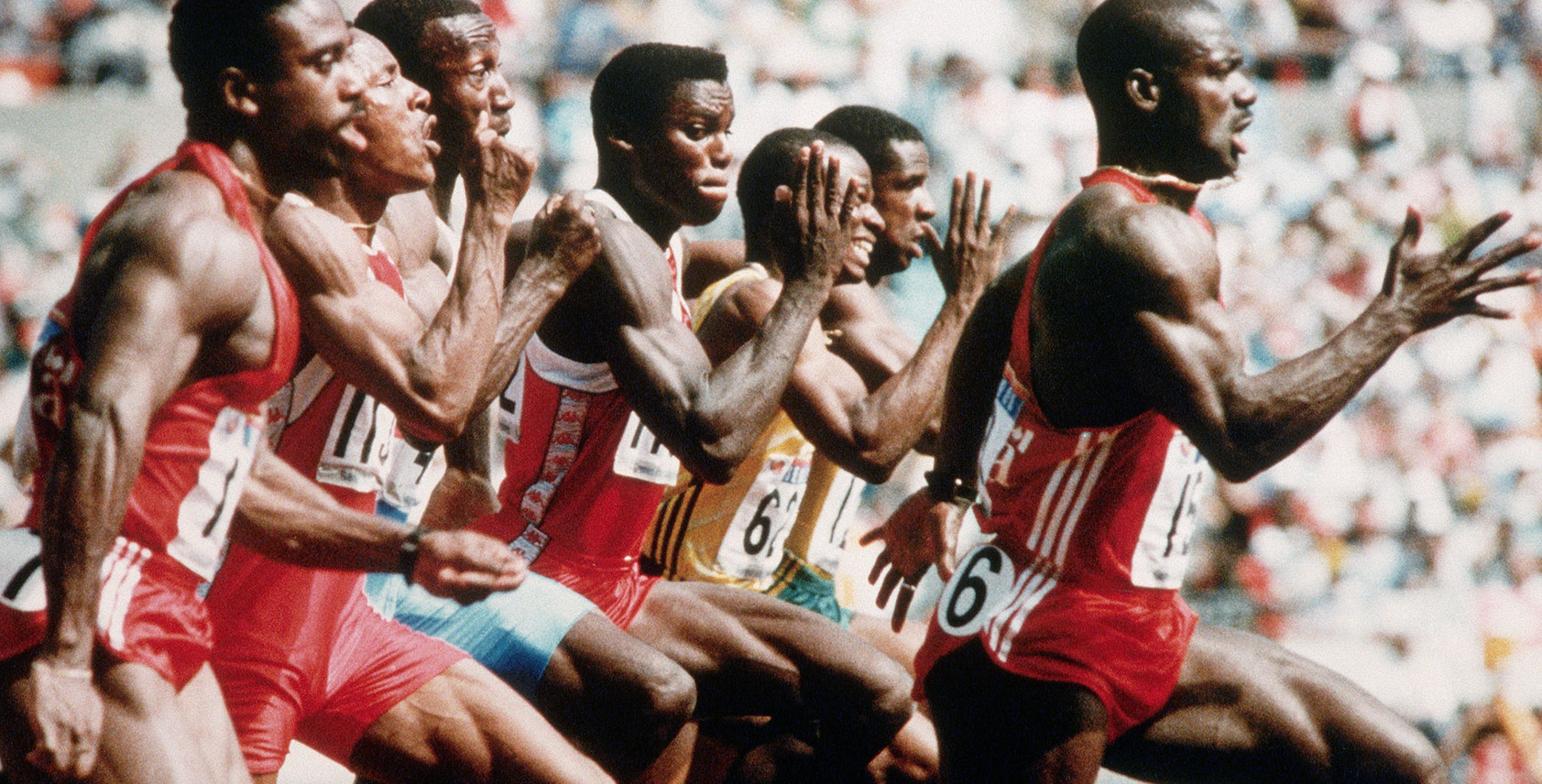Why We Can’t Help but Love the Olympics
My first Olympic memory isn’t of athletic glory, patriotic fervour, or even of warring nations brought together in the glow of the Olympic flame, united by the universalizing power of physical competition. It’s a memory of crushing, abject disappointment.
One afternoon when I was in Grade One, the voice of the principal of my downtown Toronto elementary school came on over the PA system. In a grave tone, he told the school the news: “Ben Johnson has been stripped of his gold medal.” I can’t recall exactly what happened next. Was the teacher forced to explain what steroids were to a bunch of six year olds? I just remember the sense of gloom. We weren’t asked to take a moment of silence, but it felt like a death.
This was, I’m fairly certain, the only time class was ever interrupted for an announcement about an athlete failing a PED test. Such is the power of the Olympics, a mammoth sporting event so all-encompassing that the victories and the disgraces demand public conversation, even at an elementary school. A few years later, while running the 800 metres at a city track meet, I remember looking out into the stands. In one of the top rows of the bleachers, away from the school children and screaming parents, sat Ben Johnson, silent and alone. I don’t know why he was watching a bunch of kids run around the track. Maybe just because he still loved the sport from which he’d been banned for life, and a city track meet was as close as he could get.
To me, the rise, fall, and drawn-out humiliation of Ben Johnson has remained an enduring symbol of the Olympics — a brief moment of althletic brilliance and excitement entirely surrounded by a morass of corruption and disappointment. If all sports are torn between uplifting narratives of glory and the icky realities of mass-marketed competition, the Olympics remain the champions: faster, higher, stronger, more maddeningly hypocritical.
•••
In all the obvious ways, loving the Olympics is the easiest thing in the world. You get to see the fastest, strongest humans in existence. You hear a wide range of delightful, unfamiliar national anthems. The athletes, for the most part, aren’t millionaire celebrities, but regular people (with freakish genetics) pursuing a low-paying craft with a dogged obsession that is both admirable and borderline tragic. You don’t wake up at 5 a.m. every day to practice competitive kayaking because you hope to become a millionaire. You do it because, for some reason, you love the sport. The simple fact that we’re able to watch these people during the most extreme moments of their lives is incredible. It’s the best reality TV available.
But if the heart of the games remains pure, everything around it has become hopelessly compromised. This summer, as the games make their way to Rio de Janeiro, Olympic troubles have dominated the headlines. In the months leading up to any games, there is inevitably news of impending disaster — unfinished venues, exploding budgets, infrastructure chaos. A country’s social and political issues are thrust into the spotlight. People remember, for a brief moment, that China imprisons human rights activists or that Russia imprisons gays.
Even by these low standards, however, the run-up to Rio has been disastrous. Counting off the troubles Rio faces feels like enumerating the biblical plagues. There are Zika-carrying mosquitoes that promise to cripple your first-born. Despite promises to clean up the site of the sailing competition at Guanabara Bay (one of the legacy projects that was supposed to make the games worthwhile for the average Brazilian) the water remains strewn with raw sewage, dead fish, and, in at least one instance, a human arm. The government is wracked by scandal. The country is gripped by the worst recession since the 1930s.
In response to these difficulties, the International Olympic Committee (IOC) has leaned heavily on the usual rhetoric about Olympic spirit. “In these difficult days that Brazil is facing, the flame is a timeless reminder that we all are part of the same humanity,” said Thomas Bach, IOC president.
This is, of course, the response to any problem with the Olympics. It is the only sporting event explicitly tied to lofty ideals. The Super Bowl, for all its pomp, never pretends to be anything other than a boisterous celebration of American capitalism. The Olympics wants to be both a global corporate behemoth and a symbol of humble international cooperation.
In truth, the modern games have increasingly come to stand for something different. Each year, a host city pushes aside the poor and unsightly in anticipation of the cameras of the world. In Sochi, a few years after a $51-billion Olympics, the sites sit empty and many of the oligarchs who promised to pay for them have stuck the public with the bill. We’ve seen city after city drop out of the race for the 2022 Olympics, leaving the IOC to choose between Beijing, China and Almaty, Kazakhstan — countries with human rights problems eager to buff their reputations. According to the Geneva-based Centre on Housing Rights and Evictions, in the 20 years before 2008 the Olympics were responsible for displacing over two million people, many of them forcibly evicted. The broad spectacle of the Olympics has become a symbol of bloat and low-level corruption. A competition meant to unite humanity has become a quadrennial celebration of global inequality.
This doesn’t mean this year’s games will be a failure, of course. The brilliant thing about the games is how resilient their message is, how amazingly susceptible we are to narratives about personal striving and international cooperation. Eight years after the Seoul Olympics and the disgrace of Ben Johnson, my sister and I watched the Olympics in Atlanta obsessively, memorizing each of Canada’s 22 medalists, reciting the list like some bizarre catechism.
And so it will go in Rio. Inevitably, by the time the torch is lit and the jowly members of the IOC announce the opening of these Olympic games, all concerns will be shunted aside. We’ll ignore the strange spectacle of a lavish games being hosted in a country with over 10 per cent unemployment. We’ll enjoy the sound of some foreign national anthem and watch, engrossed, as an unknown kayaker celebrates the best moment in his life.










